Biden Angers All Sides with Scaled Back Offshore Oil Drilling Plan
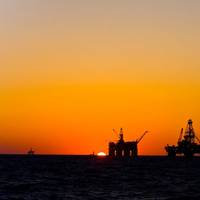
The Biden administration's plan to slash offshore oil and gas leasing drew fire from both the fossil fuel industry and environmentalists on Friday, with energy companies saying it will raise fuel prices and greens saying it undermines efforts to stop global warming. The criticism from both sides reflects the difficulty Biden's White House has had in dealing with U.S. oil extraction policies, as it seeks to balance national energy security with the need to cut greenhouse gas emissions to fight climate change.
Maritime Transport: Fuels, Emissions and Sustainability

International trade by sea has long been a key part of the world economy and approximately 90% of traded commodities is reliant on shipping. Once wind-propelled in the days of sail, the current generation of ships now heavily rely on fossil fuels. Fossil fuel propulsion contributes to global warming with carbon emissions approximating 940 MtCO2e per year and also has health implications for communities surrounding ports through the release of air pollutants. The environmental impact of fossil-fuelled engines is further compounded by their use in port infrastructure…
Nord Stream Breaches a Stark Reminder of Undersea Infrastructure Vulnerabilities
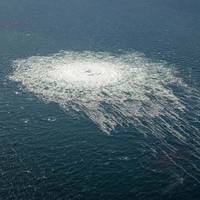
On the night of September 26, near the end of the calm season on the Baltic, a broiling kilometer-wide circle disturbed the face of the sea and a huge mass of methane erupted into the air. The gas formed a cloud that crossed Europe, in what’s considered the greatest single release of this potent greenhouse gas ever recorded.It was caused by four breaches of Russia’s Nord Stream 1 and 2 gas pipelines, located in or near the territorial seas of Denmark and Sweden. Seismologists detected explosions at a depth of 70-90 meters on the seabed.
More Shuttle Tankers Needed, Rystad Says
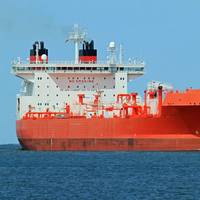
More shuttle tankers will be needed in the years ahead to keep pace with a projected rise in oil volumes needing transport, Rystad Energy said.Produced volumes requiring transport key shuttle tanker markets Brazil, Canada, Norway, the U.K. and Russia are expected to rise to 3.3 billion barrels per year before the end of the decade, jumping 35% from 2.5 billion in 2021, according to a recent report from the Norwegian analyst group.Apart from minor dips in total utilization across these countries in 2018 and 2021…
U.S. Crude Oil Exports: When 'Less is More'
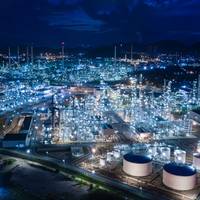
Longer sailing distances cushion fall in US crude oil exportsTon mile demand generated by US crude oil exports has fallen by 9.7% in the first two months of 2021 compared with the start of 2020. The fall could however have been much worse; In volume terms, seaborne crude oil exports have fallen by 18.8%, to 20.9m tonnes, a 4.8m tonnes decline compared with last year, according to data from the US Census Bureau.While seaborne crude oil exports to all regions have fallen, those to Asia are among the least affected, down just 1.0%, or equivalent to one Aframax load (101,088 tonnes).
Oil Removed from WWII Era Shipwreck
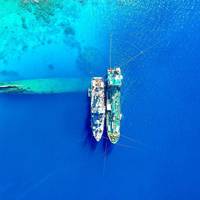
A U.S. Navy led team has removed 229,000 gallons of oil from a sunken World War II era German heavy cruiser that has been resting on the seafloor near the Marshall Islands for more than 70 years.After being transferred to the U.S. as a war prize, the cruiser Prinz Eugen was loaded with oil and cargo and used to assess survivability of warships during the Operation Crossroads atomic bomb tests in the Pacific. The ship survived two atomic blasts before being towed to Kwajalein Atoll…
Husky Energy Pact for Canadian Offshore Project
NC-Lavalin, Dragados Canada and Pennecon announced that their General Partnership (GP) has been awarded a construction contract from Husky Energy as part of the company's West White Rose Project in Newfoundland and Labrador. The GP will build a concrete gravity structure (CGS) for a fixed drilling platform. The CGS, with an overall height of 145m and base diameter of 122m, will require 76,000m3 of concrete in its construction, which will take place in a purpose built dry dock from 2017 to 2021. Once completed and installed in the White Rose field, the CGS will support a topside module to enable drilling and oil extraction 350km away from the coast of Newfoundland in the Atlantic Ocean.
Tanker Outlook Dented by Middle East Refineries
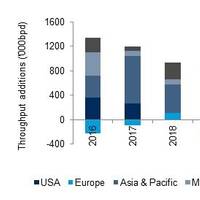
A steep rise in refinery capacity in the Middle East, the world’s crude oil production hub, will diminish oil trade growth and with it prospects for tanker shipping, according to the latest edition of the Tanker Forecaster, published by global shipping consultancy Drewry. The global crude oil trade, which surged last year on the back of strong growth in oil demand and stocking activity, is expected to continue to expand strongly over the next 18 months supported by an anticipated rise in U.S. imports. But once U.S.
Libya's Largest Oil Port Begins Work
Libya has begun maintenance of the port of Es-Sider, biggest in the country of the terminal on oil export as part of plans to increase output from Africa’s biggest holder of crude reserves, says RNS. Exports should resume in a month once official orders are received to reopen the port, says Bloomberg quoting Galal Mohamed, head of operations at Waha Oil Co. Es-Sider is part of the plan of the authorities for increase in oil extraction. The port belongs to the Waha Oil company. It has been closed since December, 2014 because of armed attack. In half a year after start of port the company plans to come to amount of 75 thousand oil barrels a day. The state National Oil Corp.
Tanker Shipping's Fortunes Rest on US Shale Oil Production
How much US shale oil production is taken out of service will be a key driver of future tanker shipping earnings, according to the latest edition of the Tanker Forecaster, published by global shipping consultancy Drewry. Tanker operators are pinning their hopes on a rise in US crude oil imports as domestic shale oil extraction becomes increasingly unprofitable. Low oil prices have made crude extraction unprofitable for many US producers, leading to a fall in US rig counts and shrinking exploration and production investment. “Continued expansion of refinery capacity in Asia is likely to maintain growth in the global oil trade over the next five years,” said Rajesh Verma, Drewry’s tanker shipping lead analyst.
Rebalancing Trade Flows
Many types of crude oil are produced around the world. Depending on the requirements of a particular refinery, a blend of heavy and light crudes is processed to manufacture a variety of petroleum products. After peaking at 9.6 million b/d in 1970, US crude oil production steadily declined until reaching a low of 4.94 million b/d in 2008. From 1970 to 2008, US crude oil imports increased sharply to bridge the gap of decreasing domestic supply and increasing demand. In response to declining North American production and anticipation of rising heavy grade imports from the Caribbean, Latin America and Saudi Arabia, many US refineries were reconfigured to process a heavy crude slate in the 1990’s.
The U.S. Maritime Bunker Market: Opportunities Abound

The global shipping industry is no stranger to challenge or change. With responsibility for delivering 90% of global trade, it has had to continually demonstrate an ability to adapt. Now, with the implementation of increasingly stringent environmental regulations, which will increase operating costs and alter the dynamic of fuel procurement, the industry will once again need to evolve. In successfully responding to the introduction of the North American Emission Control Area (ECA) in 2012, shipping has jumped a significant hurdle, but this is just the beginning. The bunker market in the U.S.
Arctic Oil & Gas - "Alaska 1, Norway 0"
E&P costs have been increasing by 11% per annum for the last five years, according to Barclays Capital, and nowhere are they increasing faster than in remote and harsh offshore environments like Alaska’s OCS or Norway’s north Barents Sea. The governments of Alaska and Norway have taken diametrically opposite courses. Alaska decreased its marginal tax on oil production from 85% to 35%, and BP promptly moved to add two new rigs to its Prudhoe Bay operations. By contrast, the Norwegian government has raised taxes on its oil industry, prompting Statoil to defer the Johan Castberg north Barents Sea project. Although the Brent oil price has shown signs of life in recent days…
Petrobras Awards Lankhorst Ropes Dyneema Deepwater Mooring Line Contract
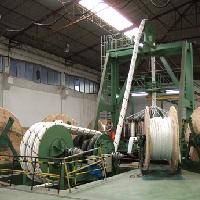
Leading deepwater rope manufacturer, Lankhorst Ropes, has secured the first-ever, worldwide order for Dyneema synthetic mooring rope for deepwater MODU (Mobile Operating Drilling Unit) projects from Brazilian oil and gas producer Petroleo Brasileiro SA (Petrobras). Gama 98 is a rope construction developed by Lankhorst Ropes specifically for deepwater mooring, and used on a number of major deepwater projects in the Gulf of Mexico. The rope will feature up to 12 Dyneema SK78 yarn sub-ropes. Developed by DSM, Dyneema SK78 is a high modulus polyethylene fibre.
RWO Supplies Reverse Osmosis for Girassol
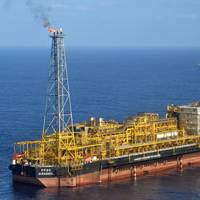
The RWO Company is supplying a complete reverse osmosis plant for seawater desalination to the international oil and gas concern Total for its Girassol project. The Girassol, the world's biggest floating production storage and offloading (FPSO) ship, is stationed 150km off the coast of Angola in Block 17 of the oilfield. The Bremen company's desalination plant will be installed aboard the FPSO in the next few weeks and guarantee reliable and independent water supply. RWO, which specialises in water and wastewater treatment aboard ships and offshore platforms…
RigNet Appoints Muller to Board of Directors
Edward Muller has been appointed to serve as a member of the Board of Directors of RigNet Inc. Paul Gundersen, RigNet chairman and CEO, said, "Ed Muller brings a valuable blend of industry knowledge and business experience to RigNet. Mr. Edward Muller was elected to the Global Marine Board of Directors in February 1997, and now serves on the GlobalSantaFe Board. A private investor, Mr. Muller was President and Chief Executive Officer of Edison Mission Energy, the wholly owned global power subsidiary of Edison International, from 1993 until 2000. In addition to RigNet, Mr. Muller currently serves as a Director for Interval, Inc., Strategic Data Corp. and The Keith Companies, Inc.
Oil Discovery in Brazil
A huge offshore oil discovery could raise Brazil's petroleum reserves by a whopping 40 percent and boost this country into the ranks of the world's major exporters, officials said according to an AP report. The government-run oil company Petroleo Brasileiro SA, or Petrobras, said the new "ultra-deep" Tupi field could hold as much as 8 billion barrels of recoverable light crude, sending Petrobras shares soaring and prompting predictions that Brazil could join the world's "top 10" oil producers. Petrobras says the Tupi field, off Brazil's southeastern Atlantic coast, has between 5 billion and 8 billion barrels -- equivalent to 40 percent of all the oil ever discovered in Brazil.
Is It A Good Thing?
Emergency response in the United States has a different perspective since the events of September 11, 2001. There is a renewed realization that preparation and planning for unforeseen events is critical and essential to success. While there has always been a need to cure the marine casualty when it occurs, now, by a process of evaluation and preparation, there exists the opportunity to prevent the event in some instances and minimize the consequences in most. An awareness of the importance of a prompt professional salvage response is beginning to permeate the public and regulatory perception. The American Salvage Association represents…
Salvage Posture Changing With The Times
Salvage response in the United States, and to a considerable degree throughout the world, has evolved to become essentially a new industry as measured by historical precedent. There are five principal factors, which have forever changed maritime casualty response to the point where it will never again rely on risk and compensation based solely on the value of property saved. Little needs to be said about the impact of the environment. We have all been aware of the increasing, persuasive impact of environmental factors for years. Simply put, it permeates and drives every emergency solution. In its infancy, and even today, environmental considerations can stall and complicate an effective, prompt salvage by extending the beginning of performance beyond a reasonable timetable.





